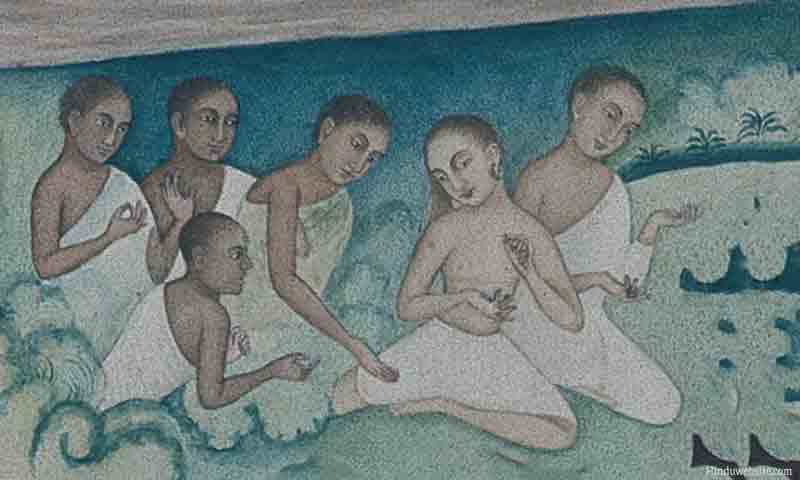
The Code of Conduct Expected of Buddhist Monks

A Buddhist monk is expected to observe a certain code of conduct in order to overcome his desire for the objects of the world and end his suffering.
To continue the three fold practice of sila (morality), prajna (wisdom) and samadhi (tranquility) on the Eightfold Path and overcome all types of craving, he has to exercise a great restraint on his thoughts, desires and behavior.
According to the tenets of early Buddhism, every monk who declared allegiance to the Buddha, the Dhamma and the Sangha was expected to follow the Eightfold Path and observe a certain code of conduct as specified in the teachings of the Buddha.
The code was based upon the life of the Buddha himself, what he practiced in his early days as a monk in search of Nirvana and later as the enlightened Buddha.
The early Buddhist monks were mostly wanderers and mendicants, who were inspired by the teachings and the personality of the Buddha himself. They travelled from village to village and rested only during the rainy season in special dwelling places known as aramas or viharas.
During their stay they practiced community and character building activities, helping each other to gain a better understanding of the teachings of the Buddha through recitation, discussions and contemplation.
The following information is taken from the Digha Nikaya, according to which a monk is expected to observe the following rules both in thought and deed. He should:
1. Give up injury to life and lay aside all types of weapons and instruments of harm.
2. Live modestly, full of mercy, desiring compassion and welfare of all living things.
3. Not take not what is not given, accept what is given and wait till it is given.
4. Live in honesty and purity of heart.
5. Give up sexual desire. He should practice celibacy and overcome the desire for sexual intercourse.
6. Give up false speech, speak truth, keep faith, should be faithful and trustworthy and should not break his promise.
7. Give up slander, not repeat what he heard in one place to another in order to cause strife, strive to unite those who are divided by strife, encourage those who are friends, take delight in peace, and speak such words that establish and make for peace.
8. Give up harsh speech, speak words that are devoid of blame and criticism, words that are pleasing to the ears, touching the heart, cultured, pleasing to the people and loved by them.
9. Give up frivolous talk, speak appropriately at the right time, in accordance with facts, with words full of meaning, memorable, timely, well illustrated, measured and to the point.
10. Not do any harm to the plants and seeds.
11. Take only one meal at a time, not eat during the night or at the wrong time.
12. Not watch shows or attend fairs with song dance and music.
13. Not wear ornaments, or adorn himself with garlands, scents, or cosmetics.
14. Not use high or large beds.
15. Not accept gold or silver, raw grain, or raw meat.
16. Not accept women or girls, bondmen or bondwomen, sheep or goats, fowls or pigs, elephants or cattle, horses or mare, fields or houses.
17. Not act as a go-between or a messenger.
18. Not buy or sell, or falsify with scales, weights or measures.
Suggestions for Further Reading
- Buddhism - The Concept of Anatta or No Self
- Anatta or Anatma in Buddhism
- Anicca or Anitya in Buddhism
- The Buddha on God
- The Buddha on Avijja or Ignorance and on the Origin of Life
- The Buddha On the Self And Anatta, the Not-Self
- History Of The Four Buddhist Councils
- Chinese Buddhism
- The Eightfold Path Of Buddhism
- The Four Noble Truths of Buddhism
- Four Stages of Progress on the Middle Way in Buddhism
- The Practice of Friendliness, Kalyanamittata, in Buddhism
- Karma or Kamma In Buddhism
- Mahayana Buddhism
- Buddha's Last Days and Final Words
- Buddhism - The Middle Way
- The Buddha's Teaching on Right Mindfulness
- The Meaning and Practice of Mindfulness
- Buddhism - Vinaya or Monastic Discipline
- Right Conduct For Lay Buddhists
- Nirvana or Nibbana in Buddhism
- Buddhism - Objects of Meditation and Subjects for Meditation
- Buddhism - Right Speech and Mind Training
- Buddhism - Right Living On The Eightfold Path
- Handbook for the Relief of Suffering by Ajaan Lee
- Theravada Buddhism
- Meat Eating or Vegetarianism in Buddhism
- Essays On Dharma
- Esoteric Mystic Hinduism
- Introduction to Hinduism
- Hindu Way of Life
- Essays On Karma
- Hindu Rites and Rituals
- The Origin of The Sanskrit Language
- Symbolism in Hinduism
- Essays on The Upanishads
- Concepts of Hinduism
- Essays on Atman
- Hindu Festivals
- Spiritual Practice
- Right Living
- Yoga of Sorrow
- Happiness
- Mental Health
- Concepts of Buddhism
- General Essays